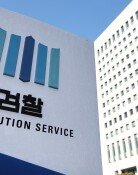Hyundai Motor, Hanwha Q Cells join hands in ESS development projects
Hyundai Motor, Hanwha Q Cells join hands in ESS development projects
Posted June. 01, 2020 07:47,
Updated June. 01, 2020 07:47
Hyundai Motor Group and Hanwha Q Cells will jointly carry out energy storage system (ESS) development projects that recycle electric vehicle (EV) batteries.
South Korea's major carmaker announced on Sunday that Hyundai Motor President Chi Young-cho and Hanwha Q Cells President Kim Hee-chul signed an MOU agreement to jointly develop photovoltaic ESS projects on Friday at the Hanwha Group headquarters of in central Seoul. The two major South Korean conglomerates are planning to co-develop energy storage systems that are made from recycled Hyundai EVs so that they can power homes and network grids while searching for new business fields regarding photovoltaic energy storage systems.
The ESS-related MOU is expected to bring mutual benefits to both of the signatories. Hyundai Motor Group can handle the issues with used batteries in EVs in eco-friendly manner, and Hanwha Q Cells can gain a competitive edge in pricing ESS by accessing stable supply of recycled EV batteries. An average of 500 times of charge reduces EV battery capacity to its 70 to 80 percent levels, making the per-charge electric car range lower than guaranteed levels by automakers. However, batteries in EVs can later turn into an energy storage system that captures a large voltage of electricity. Once Hanwha Q Cells’ photovoltaic technology powers up the project, it can broaden the horizons of eco-friendly and renewable energy industries.
Hyundai Motor Group and Hanwha Q Cells aim to ensure price competitiveness by advancing the development of photovoltaic energy storage systems made from recycled EV batteries. ESS projects cost developers a large amount of initial investments because they run on lithium-ion batteries just like electric cars. The key to gaining the upper hand in the global market lies in obtaining ESS supply stability given that the global ESS industry by 2040 will increase to generate 379GWh, which is equivalent to one year’s energy needs of 140,000 households, 128 times up from 2017, according to Bloomberg New Energy Finance. Apart from the joint project with Hanwha Q Cells, Hyundai Motor Group will strengthen its efforts to carry out EV battery-based ESS projects by cooperating with ESS businesses such as the Korea Hydro & Nuclear Power and OCI.
Hyung-Seok Seo skytree08@donga.com




![“한동훈, 정치생명 걸고 무소속 출마해 평가받는 것 고려할만”[정치를 부탁해]](https://dimg.donga.com/c/138/175/90/1/wps/NEWS/IMAGE/2026/01/19/133186982.1.jpg)


